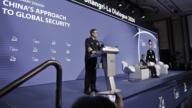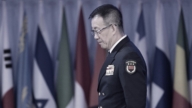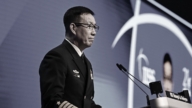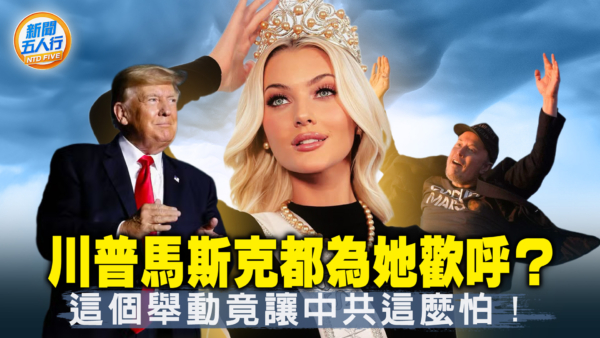【新唐人2012年11月10日讯】对于十八大,现在全球关注的焦点是这次开幕式,看到一群退休的中共领导人纷纷出笼,当中最受瞩目的莫过于中共前总书记江泽民。有评论指出,胡锦涛把江泽民拉进十八大,是给习近平做样版,借此传递未来他也要“垂帘听政”的讯息。外界认为,中共十八大开幕发出的信号,是中国新一届领导人的活动空间有限,党内领导人可能根本无心开展决定中国未来走向的政治改革。
十八大开幕式由人大委员长吴邦国主持,除了中共十七届政治局委员和常委之外,江泽民、朱镕基、李鹏、李瑞环、宋平等元老,也都在主席台的前排就座。
时政评论家孟渊沛:“像回到毛泽东、邓小平时代中顾委员那些老人,这就是中国政治的倒退。老人政治是封建专制的一个特色,老人政治通过权力非正常的一个传递,一代指定一代。就是没有选举的,到最后都形成了一个老人政治,这是不民主的一个社会政治生活常见的一个现象。”
一群退休的中共领导人几乎倾巢而出,而当中最受瞩目的莫过于中共前总书记江泽民,虽然高龄86岁,走路还需要人搀扶,但他还是不改本色,如五年前的十七大上,斜眼偷瞄倒茶水的女服务员,今年也不例外。
对于中共的权力交接,时事评论员汪北稷表示,在民主国家,一旦新的国家领导人诞生以后,原来的前任领导人,在预定的时间内完成工作交接后,就要离开他的工作岗位,然后再以前领导人的身份,过一个普通百姓的生活。反观中国,这些卸任的领导人占用社会资源,浪费民脂民膏,还要干涉现任领导人的管理工作。汪北稷说,十八大的会议一眼望去,都成了“三代同堂”的画面了。
时事评论员汪北稷:“这些上了年纪的人却不知道自爱,还在这个舞台上面,这种表现让我们在民主社会生活过的人,感到很刺眼,很难过,为中国人民百姓感到很难过,这么大年纪的人还挤在这个主席台上去抢这个权力。”
开幕式上午,总书记胡锦涛提出政治报告,长达一个半小时的内容,听得不少领导昏昏欲睡。英国广播电视(BBC)说,胡锦涛是借报告来巩固他在党内承传的地位。
时政评论家孟渊沛也指出,中共大老集体亮相,实际上就是专制者害怕被清算的一个表现。因为这套选举的机制不是民主的,是不规则的,新上来的对老的不服,但是老的又不退,要来压住新上任的。
孟渊沛:“无论是胡锦涛、江泽民还是周永康他们都想退而不休,因为他们一旦全退、全休的话,他们考虑他们的不仅是地位权力的问题,主要是人身安全,因为他们在位的时候干下的滔天的罪行,他们一定要被清算,所以他们就一定要保留在那个位置上,想方设法留下来,他们对继任者都是不放心的。”
孟渊沛还表示,这次十八大的权力介入,场面很震撼。这个专制政治以后可能会转为军阀政治,因为没有游戏规则。
孟渊沛:“现在高层都血风腥雨的,你不介入你就得死啊,所以江泽民一定要强力的介入。他们对胡锦涛这面的一些人感到不放心,比如说温家宝,压住温家宝的气势。还有汪洋,还有令计划,他们觉得不稳的这些人一旦上台,一旦掌握所有权利,就会改革,改革首先就会损害他们的利益,甚至性命。”
外界评论,新一届的领导人习近平头顶上有太多“太上皇”了,活动空间有限,未来他既要保党,又要保现有这些既得利益者,对于民众期待的政治改革之路,答案肯定是令人不满意。
采访/陈汉 编辑/黄亿美 后制/郭敬
CCP Regime’s Political Reform Hardly Expected
The world’s attention is focused on the opening ceremony
of the18th Party Congress.
A group of retired Chinese Communist Party (CCP) leaders
appeared at the ceremony.
The spotlight was on Jiang Zemin, former CCP
General Secretary.
Commentators say that Hu Jintao used Jiang
to hint at his “reign behind a curtain” to Xi Jinping.
Analysts think that the CCP Congress shows that
its new leader team is subject to obvious political restraint.
Therefore, China is not expected to see real political reforms.
Wu Bangguo chaired the opening ceremony of
the 18th Party Congress.
Members of the 17th Party Congress Politburo and
of its Standing Committee attended the conference.
The retired CCP veterans present included Jiang Zemin,
Zhu Rongji, Li Peng, Li Ruihuan and Song Ping.
Critic Meng Yuanpei: “It’s like going back to the era under
Deng Xiaoping’s Central Advisory Commission.
This is a political regression in China to
form a “politics of the elderly”.
In this way, the Party’s veterans have passed down power
and nominated the new generation of leadership.
All CCP leaders were not elected. The “politics of the elderly”
is unusual compared to democratic politics.”
Nearly all retired CCP leaders showed up
at the 18th Congress.
86-year-old Jiang Zemin moved into the spotlight,
Hu walked alongside while another supported his arm.
Just as he did at the 17th Party Congress five years ago,
Jiang peeked askew at the waitress pouring tea.
Critic Wang Beiji comments on the CCP power transition.
He said that in a democratic state, once the new leader is
elected, the ex-leader will leave the position after job handover.
From then on, his identity is just a former leader.
This is in a sharp contrast to CCP retired leaders,
who consumed public wealth through their privileges.
Further, they intervene in the incumbent CCP leaders’ work.
Wang Beiji describes the 18th congress as just like
a family party at which all three generations were present.
Wang Beiji: “All these elderly don’t know about self respect,
still lingering on the political stage.
This is really unnatural behavior, in the eyes of
Chinese living in democratic countries.
We just feel sad for our Chinese fellow citizens, as these
elderly, at such an old age, still jostle to grab power.”
On its opening ceremony, CCP General Secretary
Hu Jintao delivered a 1.5-hour report.
The BBC reviewed that Hu had used the report
to cement his position inside the CCP.
Critic Meng Yuanpei says, CCP veterans’ group show-up
actually shows they fear ending up with punishment.
This is because that CCP leader appointment never goes
through democratic election.
The Party’s new leadership team unwillingly
obeys the predecessor.
Yet, the predecessor refused to truly step down, and
wanted to dominate the successor, Meng Yuanpei remarks.
Meng Yuanpei: “Those CCP leaders, including Hu Jintao,
Jiang Zemin and Zhou Yongkang, all wanted to retire but remain in office.
Because once they completely step down, their main concerns
are not only the power, but also their personal safety.
They know that one day, they’ll be brought to justice for
all crimes they have committed in office.
So they just tried so hard to stay in office,
for they don’t trust their successors."
Meng Yuanpei adds that the 18th Party Congress
was heavily power dominated.
This authoritarian ruling may be turned into warlord politics,
as it never sets up game rules.
Meng Yuanpei: “Now the CCP top level is busy with
bloody infighting. Who gives up, that’s who will be sacrificed.
That’s why Jiang Zemin and his men
desperately intervened.
They don’t trust the faction under Hu Jintao.
For example, they attempted to suppress Wen Jiabao’s vigor,
to hold down Wang Yang and Ling Jihua.
They feared that these people, once in power,
will launch reform which will directly threaten their power and even their lives."
Political observers remarked that CCP new leader Xi Jinping
is now subject to too many “backstage rulers".
In the future, it is the restrained Xi, who will have to
secure the CCP, as well as vested interest groups.
Therefore, commentaries do not expect that Xi will
satisfy the populace on their much-anticipated political reform.




























